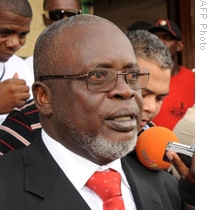Dakar
29 July 2009
 |
| Malam Bacai Sanha at a polling station in Bissau, 26 Jul 2009 |
Guinea-Bissau's electoral commission says Sanha won Sunday's second round of balloting with more than 63 percent of the vote.
Political observers in Bissau say he appears to have benefited from the support of those who voted for independent candidate Henrique Rosa in last month's first round of balloting. Rosa took more than 24 percent of that vote, but finished third and was therefore knocked-out of the second-round runoff.
Sanha received more than 40 percent of ballots cast in the first round, but was forced into Sunday's runoff against opposition candidate Kumba Yala because neither man claimed more than 50 percent of the vote.
The electoral commission says Yala won more than 36 percent of Sunday's vote. That is a slight improvement over the 29 percent of the ballots he won in the first round, but observers say Yala struggled to gain broader support as his 2000-2003 presidency is best remembered for the arrest of political opponents and financial mismanagement which resulted in civil servants not being paid for nine months.
Yala often appeared on the campaign trail brandishing an axe. European Union electoral observers say he engaged in "persistent, serious, inflammatory accusations" against Sanha without evidence.
But EU observers say Sunday's vote was transparent, inclusive, and well-administered, with more than 60 percent of voters turning out to cast their ballots. The EU report criticizes Sanha for using state resources to benefit his campaign.
On the campaign trail, Sanha called for an end to political assassination in a country with a history of army mutinies and coups. President Vieira was killed in March, hours after his chief political rival died in a bomb blast.
Military police killed one of the opposition candidates in the first round because they said he was resisting arrest for plotting a coup. His family says he was shot in his bed at four in the morning.
Having elections in one of the world's poorest countries is not the problem. Regional diplomats say the challenge for the new president will be forcing Bissau's military to respect civilian leadership and keep out of politics.